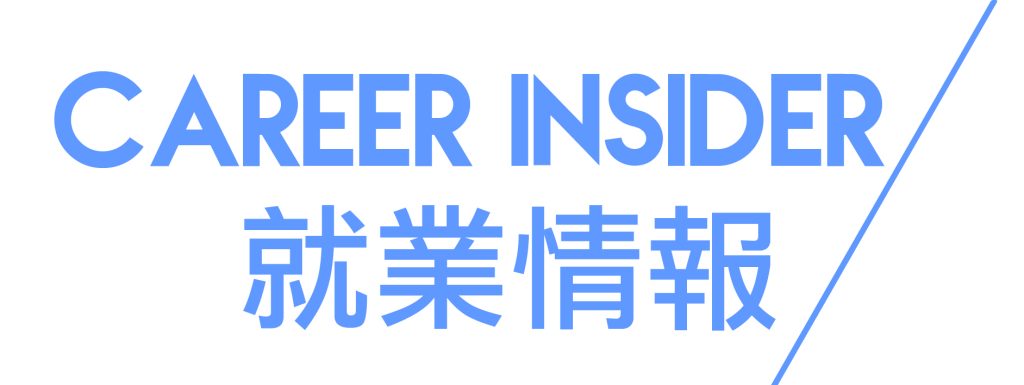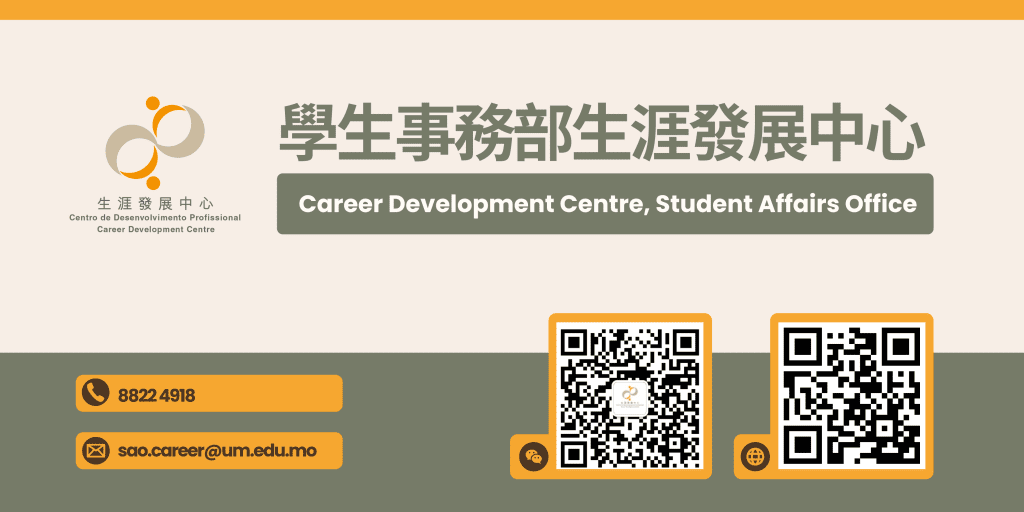[Career Development Centre of Student Affairs Office] Career Insider (6): Answering Current Affairs Questions in Interviews: Techniques and Tips
[學生事務部 生涯發展中心] 就業情報 (六):時事問題的答題技巧

Career Insider (6)
就業情報 (六)
Answering Current Affairs Questions in Interviews: Techniques and Tips
時事問題的答題技巧
In interviews, current affairs questions are a key component for assessing a candidate’s overall competence. While these questions may seem daunting to fresh graduates, mastering the right approach can turn challenges into opportunities and earn extra points.
1. Stay Updated on News and Hot Topics
Current affairs questions often revolve around trending topics such as politics, economics, society, and technology. Graduates are encouraged to develop a habit of reading the news regularly, choosing reputable media sources to ensure accuracy. Pay special attention to industry-related news to better connect professional knowledge with practical applications.
2. Structured Thinking
When faced with current affairs questions during an interview, remain calm and composed. Use the following structure to organize your response:
– State the Facts: Briefly summarize the basic situation of the event.
– Express Your Opinion: Analyze the significance or impact of the event based on your understanding.
– Connect to the Position: If possible, relate the current event to the requirement of the position you are applying for to demonstrate your insight and relevance.
3. Practice with Mock Questions
Before the interview, practice with classmates or mentors by simulating responses to recent hot topics. This helps improve your speaking pace, logical flow, and confidence in handling pressure.
4. Maintain a Sincere and Rational Attitude
Current affairs questions are not about having the ‘correct’ answer, but about showcasing your critical thinking and values. Even if your viewpoint is not fully developed, clear and well-reasoned expression can leave a positive impression. Avoid blindly following trends or expressing extreme opinions—demonstrate rationality and openness.
5. Showcase Your Personality Appropriately
If you have a unique perspective on a current affairs issue, feel free to incorporate personal insights into your response. This not only makes your answer stand out but also helps interviewers better understand your character and thought process.
In summary, current affairs questions in interviews are an opportunity to demonstrate your comprehensive qualities. With proper preparation, calm demeanor, and sincere expression, you can present your best self during the interview.
在面試中,時事問題是考官評估候選人綜合能力的重要環節。面對這類問題,畢業生可能會感到壓力,但只要掌握正確的方法,完全可以化挑戰為機會,給自己加分。
- 平時多關注新聞熱點
時事問題通常圍繞當前熱門話題展開,如政治、經濟、社會、科技等。建議畢業生平時養成閱讀新聞的习惯,選擇信譽良好的媒體來源,確保信息的準確性。特別是行業相關的新聞,可以幫助你更好地聯結專業知識與實際應用。
- 結構化思考
面試中遇到時事問題,保持鎮定和冷靜。可以按照以下結構組織回答:
陳述事實:簡單概述事件的基本情況。
表達看法:結合個人理解,分析事件的意義或影響。
聯結崗位:如果可能,將時事與應聘崗位的需求掛鉤,展示你的洞察力和相關性。
- 練習模擬答題
在面試前,可以與同學或師長進行模擬練習。選擇近期熱點事件,互相提問並練習回答。這樣不僅能提升語速和邏輯性,還能增強應對壓力的信心。
- 保持真誠與理性的態度
時事問題並非要你擁有標準答案,而是考察你的思辨能力和價值觀。即使觀點不夠成熟,只要表達清晰、有理有據,也能給考官留下好印象。切忌盲目追隨熱潮或過於偏激,展現出理性與包容的姿態。
- 適當展示個性
如果你對某個時事問題有獨特的看法,不妨在回答中加入個人特色的分析。這不僅能讓你的回答脫穎而出,也能幫助考官更深入了解你的性格和思維方式。
總結來說,面試中的時事問題是檢驗畢業生綜合素養的機會。只要做好準備、保持冷靜並真誠表達,你一定能在面試中展現出最佳狀態!

Are you looking for job opportunities? Log on to the “UM Student Job Vacancy System “ (https://isw.um.edu.mo/umsjv/) to find the latest employment information, including full-time and part-time jobs. The system is updated irregularly, so be sure to check for job vacancies periodically. You can also subscribe to receive updates from the system.
正尋找工作機會?歡迎你登入「澳大學生職位空缺系統」 (https://isw.um.edu.mo/umsjv/),尋找最新的就業資訊,包括全職和兼職。系統會不定期更新,建議你不時登入系統查看最新職位空缺資料,你也可以訂閱系統的更新通知。
